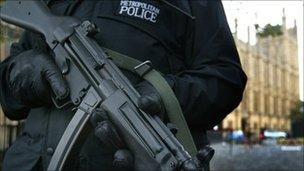Met Police counter-terrorism role should end, MPs say
- Published
- comments

The Met's counter-terrorism role covers the whole of the UK
The Metropolitan Police's counter-terrorism role should be given to the new National Crime Agency when it becomes operational in 2013, MPs say.
The Home Affairs Select Committee says the change would mean less intervention in the Met by the Home Secretary and its accountability would be clearer.
Its adds that uncertainty over police reforms for England and Wales could be damaging to the 43 forces.
The Home Office says its plans will lead to improvements in policing.
Under the Police Reform and Social Responsibility Bill, external, the government set out plans to introduce police and crime commissioners, elected by the public, in place of police authorities and greater collaboration between forces.
The wide-ranging report from the cross-party committee of MPs says the scale of the reforms was unprecedented and the scope for mistakes "accordingly large".
It said it was "unacceptable" that, with the National Policing Improvement Agency being phased out next spring, there were still no definite decisions about many of its functions. It called for the NPIA closure to be delayed until the end of 2012.
But the MPs said Scotland Yard should not be given any additional national policing functions in the wake of the phone-hacking scandal, which lead to the resignation of Sir Paul Stephenson as commissioner amid questions about the Met's investigation.
National services including the DNA database, the Police National Database, and the Police National Missing Persons Bureau also needed to be taken on by new organisations but such a move would not be helpful "either for it [the Met] or for the police service as a whole", it added.
The Met's Counter Terrorism Command, SO15, based at New Scotland Yard, has responsibility for protecting London and the UK from terrorism.
The Home Affairs Committee says the terrorist threat is a "national problem" there would be "advantages" in transferring responsibility to the National Crime Agency.
"Such a change would also allow for greater clarity in the leadership and accountability of the Metropolitan Police through the Mayor of London, since there would be less justification for involvement by the Home Secretary: For example, in appointing the Metropolitan Police Commissioner," it said.
The government's police commissioner plans have already been moved from May to November next year.
The MPs called for other key reforms to be delayed and in its report cited the Police Superintendents' Association's view that "it feels like pieces of the new policing jigsaw are being put together in different places without having agreed what the picture on the box should be".
They also condemned IT services in the police service as a whole as "not fit for purpose".
'Warnings ignored'
Keith Vaz, the committee's chairman, said: "We are deeply concerned that more than a year after the publication of the consultation paper, many of the details of the government's proposals are still unclear...
"The police perform a difficult and dangerous task on behalf of the public and the continuing uncertainty about the future of many of the bodies involved in policing has the potential to be very damaging."
Paul McKeever, Chairman of the Police Federation of England and Wales said: "The government is choosing to ignore our warnings about the impact of planned reform and more worryingly they have turned a blind eye to the public's concerns about cuts to policing.
"We are not asking the prime minister to scrap all of the plans for reform, we are simply asking that he and his cabinet pause, and take time to reflect and listen to what the men and women who police our streets are saying."
The Home Office says it will review arrangements for the Met's counter-terrorism role after the London Olympics take place next year.
Policing minister Nick Herbert added: "The police bill has just received Royal Assent, we are saving over three million hours of officer time by cutting red tape, we are driving new arrangements for forces to buy equipment and services together and converge IT, and we are just about to appoint the head of the National Crime Agency.
"We are pushing ahead with reforms which will free the police to fight crime, deliver better value for the taxpayer, and give the public a stronger voice."
- Published8 June 2011
- Published8 September 2011
- Published18 July 2011